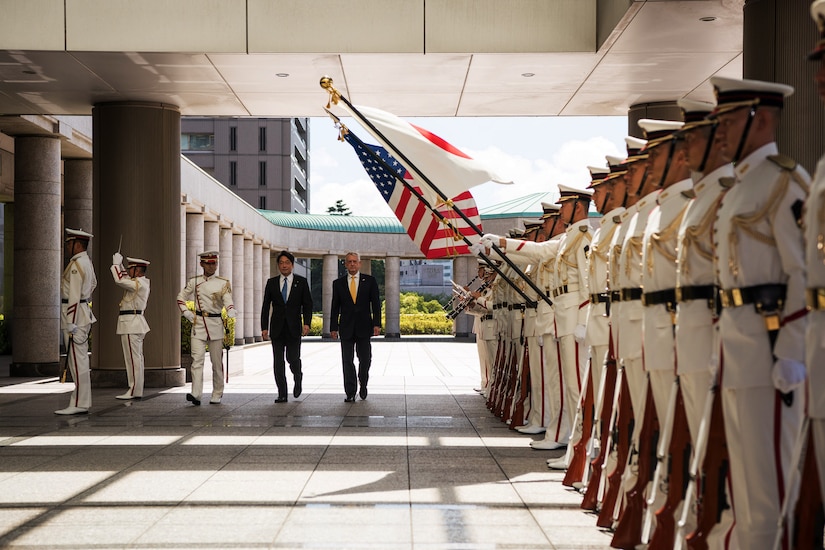By Lisa Ferdinando, DoD News, Defense Media Activity
WASHINGTON -- The United States and Japan are strong allies
firmly committed to peace and security in the Indo-Pacific region, Defense
Secretary James N. Mattis said yesterday in Tokyo.
In a media availability after talks with Japanese Defense
Minister Itsunori Onodera, Mattis said he and his Japanese counterpart
discussed the opportunities to increase the alliance’s capability, deepen
cooperation and enhance regional security.
“We’re in the midst of very unprecedented negotiations right
now with North Korea,” Mattis said. “But in this dynamic time, the
long-standing alliance between Japan and the United States stands firm.”
He described the U.S.-Japan alliance as a “cornerstone of
Indo-Pacific stability,” saying the U.S. commitment to the alliance “remains
ironclad with a long-term ally.”
Mattis noted the trip was his seventh visit as secretary of
defense to the Indo-Pacific region. It was his fifth meeting in recent times
with Onodera, he said.
“These visits represent just how strongly we prioritize this
relationship between our two militaries,” he said. “I think it’s fitting for
trusted allies as America continues to look west and to strengthen
long-standing alliances as specified in President [Donald J.] Trump’s
Indo-Pacific Strategy.”
Remaining Vigilant on North Korea
Mattis thanked Japan for its commitment to peace and
security on the Korean Peninsula, and he underscored the role of the diplomats
in the process.
“Our objective remains the complete, irreversible and
verifiable dismantling of North Korea’s nuclear and ballistic missile
programs,” Mattis said. “Especially now, we remain vigilant, and I thank Japan
for its ceaseless efforts to promote stability and security.”
The diplomats, Mattis said, are “firmly in the lead,” in
alignment with the agreement signed this month by Trump and North Korean leader
Kim Jong Un.
“As our diplomats work to bring this agreement to fruition,
the U.S. military, in close coordination with our allies and partners,
continues its clear-eyed approach, supporting international sanctions and
multiple unanimous U.N. Security Council resolutions,” Mattis said.
The secretary said a pause in U.S.-South Korean joint
military exercises is meant to “create space for our diplomats to negotiate
strongly, and increasing the prospects for a peaceful solution on the
peninsula.” The United States maintains a strong, collaborative defense stance,
he said, “to ensure our diplomats continue to negotiate from a position of
unquestioned strength.”
Further, Mattis said the United States recognizes the
importance of the Japanese abductee issue. He noted Trump raised the issue at
the U.S.-North Korean summit in Singapore. He described it as a “humanitarian
issue always present in our deliberations,” referencing the unresolved issue in
which North Korean agents abducted Japanese citizens in the 1970s and 1980s.
Gratitude for Rescue of U.S. Pilot
Mattis thanked Japan for its rescue of a U.S. Air Force
pilot who crashed in the waters south of Okinawa on June 11.
“Thank you for saving the life of our pilot who went down at
sea,” Mattis said. “He’s back home with his family, recovering from his
injuries.”
The pilot of the Air Force F-15C Eagle assigned to the 18th
Wing’s 44th Fighter Squadron successfully ejected and was recovered by Japan
Air Self-Defense Force‘s Naha Rescue Squadron, according to U.S. Forces Japan.
The pilot was in serious condition, a statement said.
Japan was Mattis’ last stop before returning to the United
States. He also visited Alaska, China and South Korea during the tour.








